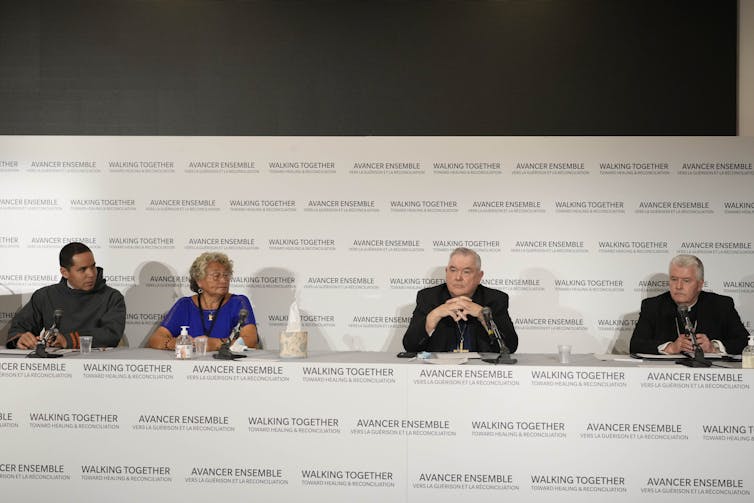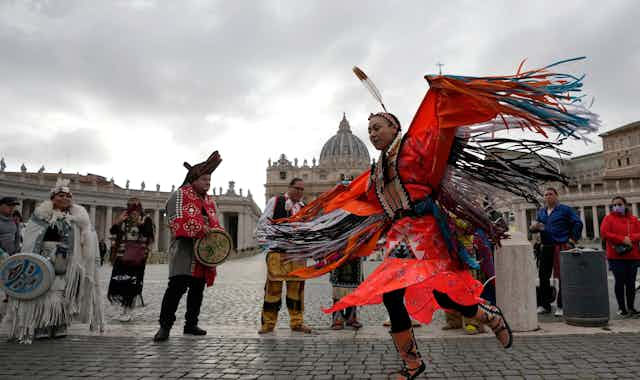Only in the past few decades have survivors of the residential school system spoken out publicly about the injustices they endured in these colonial school systems.
More recently, governments, organizations and institutions have initiated acts of reconciliation, particularly in light of the Truth and Reconciliation Commission (TRC) and its Calls to Action.
While there have been some apologies issued, many survivors have highly anticipated an apology from the Pope, in Canada.
Read more: Indian Residential Schools: What does it mean if the Pope apologizes in Canada?
Pope Francis will visit Canada from July 24 to 29. Many are hopeful he will issue an additional apology — one that is full of accountability and institutional responsibility, unlike the one issued at the Vatican on April 1.
Years of research
As a member of the Kainai (Blood Tribe), part of the Blackfoot Confederacy, it took years of research before I understood the connection between the strange and heavy silences I recognized as a child but could not name and the devastation caused by colonialism inflicted by the Canadian government and Christian churches through the Indian Residential School System.
Part of my research involved articulating my journey and that of my community in navigating the written records of the Roman Catholic order, the Oblates of Mary Immaculate. These records contained information about our people, and we used them to identify our ancestors and to research the colonial education system on the Blood Reserve. The Oblates came to the Blood Reserve and opened a residential school, as did representatives of the Anglican Church. Representatives of Catholic, Anglican and Methodist denominations were involved in running colonial schools on the Blood Reserve.
Earlier statement made in Rome
The TRC’s Call to Action No. 58 asks the Pope to “issue an apology to survivors, their families, and communities for the Roman Catholic Church’s role in the spiritual, cultural, emotional, physical, and sexual abuse of First Nations, Inuit and Métis children in Catholic-run residential schools,” and to do so in Canada.
An apology in line with this call would help demonstrate the Roman Catholics’ responsibility in the colonial education system.
Pope Francis’s earlier apology, in April, mainly addressed the cultural abuse Indigenous Peoples suffered. He said:
“The chain that passed on knowledge and ways of life in union with the land was broken by a colonization that lacked respect for you, tore many of you from your vital milieu and tried to conform you to another mentality. In this way, great harm was done to your identity and your culture … following programs devised in offices rather than the desire to respect the life of peoples.”
A statement like this places the blame on colonization and fails to acknowledge the Catholic Church’s role in supporting these negative colonial outcomes for Indigenous Peoples.
Pope Francis also said, “I feel shame … in the abuses you suffered and in the lack of respect shown for your identity, your culture and even your spiritual values.” This is the extent to which the Pope acknowledged specific types of abuse that Indigenous children suffered at the hands of religious members.
Read more: Catholic Church response to sexual abuse must centre on survivor well-being, not defensiveness
Pope Francis did not address how Catholic-run residential schools negatively impacted generations of Indigenous Peoples through spiritual, emotional, physical and sexual abuse. Nor did he articulate any formal plan for how the Catholic Church would attempt to walk the path of reconciliation.

Truth, justice, relationships
There are many of us who hope Pope Francis’s visit will bring a new and more sincere apology.
The Pope must set foot in our communities and onto our reserves. He must see the lasting impacts the Catholic Church has had. He must have conversations, build relationships and listen to the needs of First Nations, Métis and Inuit peoples. He must learn that healing and reconciliation will look different across various communities.
The Pope must make a plan with us, not for us, in order to walk the path of reconciliation.
If the Pope cannot provide a plan while he is here, due to the short visit, he can set things in motion. Indigenous Peoples need more than words. Pope Francis should commit to timelines for formal actions and plans.
These plans should include commitments for representatives of the Catholic Church with the power to make high-level decisions to work with Indigenous communities, and to fulfil all of the TRC’s Calls to Action related to the Catholic Church and to attend to any additional needs.
How to move forward
As someone who has researched colonial schooling, and who has learned from other experts and Elders in my community, I offer the following suggestions of how to move forward. This is by no means an exhaustive list:
The Catholic Church should work with Indigenous communities to determine if criminal investigations will be made into the abuses Indigenous children suffered at the hands of adults who were in charge of residential schools. Survivors have asked the Pope to acknowledge church failures in reporting abusers, and the church must hold those accountable who are still alive today.
The papal bulls (edicts) used to justify the doctrine of discovery and terra nullius must be revoked.
Catholic records pertaining to the 1870-1990s colonial school systems must be released and copies given to relevant Indigenous communities.
In response to requests from survivors, Pope Francis must recognize that many students were buried in unmarked graves and a plan should be shared to aid Indigenous Peoples while they uncover unmarked graves.
Indigenous artifacts at the Vatican must be investigated to determine authorship, and dialogue must happen with the appropriate communities on the fate of the artifacts.
The Catholic Church must live up to the original Indian Residential Schools Settlement Agreement.
A new apology from the Pope must be issued on Canadian soil.
As Pope Francis declared in his April statement, “Whenever memory and identity are cherished and protected, we become more human.”
Let us see how the Pope will cherish and protect the memory and identity of Indigenous Peoples by engaging in truth and justice. Such actions will help the world see we are human beings, which colonization and the colonial education system stole from us.
If you are an Indian Residential School survivor, or have been affected by the residential school system and need help, you can contact the 24-hour Indian Residential Schools Crisis Line: 1-866-925-4419.

